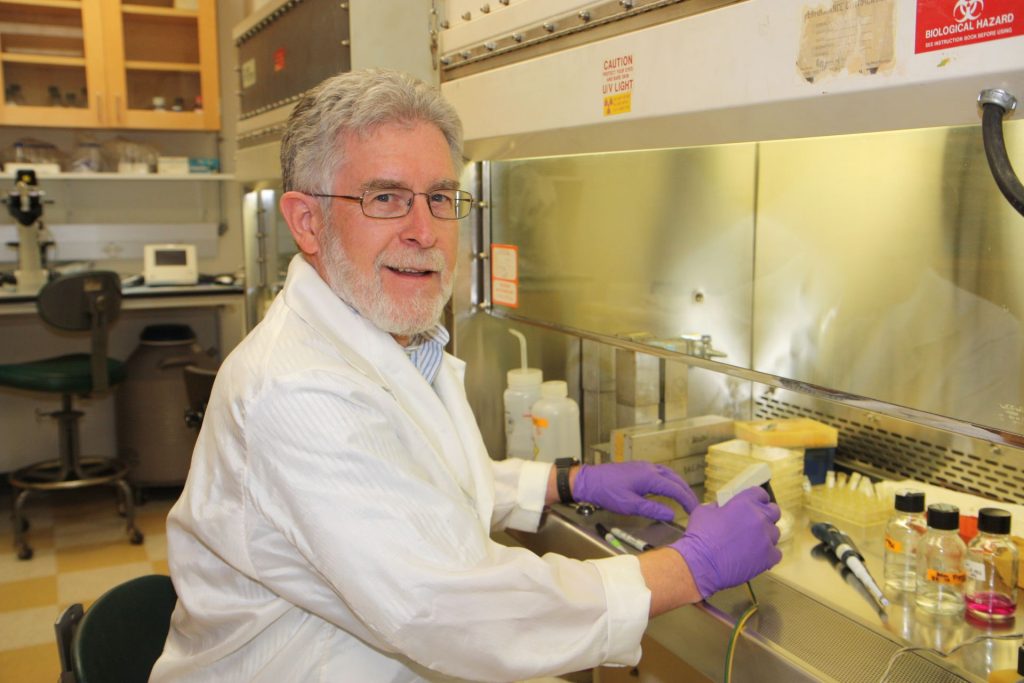Fruits of Faculty Research To Drive Future Advancements at UTD
By: Daniel Steele | February 17, 2023

In 2014, a drug to treat Morquio A syndrome, a rare genetic disease, was approved by the FDA for public use. A key step in producing the drug uses biotechnology originating from basic research performed at The University of Texas at Dallas by Dr. Rockford Draper, professor of biological sciences, and his research group.
Today, royalties generated by this technology transfer are funding eight new endowments in the School of Natural Sciences and Mathematics, including two distinguished chairs, an early career faculty award and graduate student fellowships.
The intent of these new endowments is to create a virtuous circle of impact, using the fruits of past research to drive future advancements in human knowledge and living.
“Curiosity-driven basic research discovers new knowledge. New knowledge can solve new and old problems to improve human health and quality of life,” Draper said. “Most new knowledge is generated at universities and research institutions by faculty, students and staff, who push the boundaries of their fields. It greatly benefits society to provide faculty at those institutions with resources to do their work.”
Morquio A syndrome is an inherited genetic disorder that occurs in roughly one of every 200,000 births. Patients with Morquio A syndrome have a genetic mutation that inhibits the production of an enzyme necessary to remove sulfate from complex carbohydrates throughout the body. If sulfate is not removed, patients cannot degrade and remove the complex carbohydrates, with the result that they accumulate in patients’ bones, cartilage and connective tissues. Over time, the progressive carbohydrate accumulation causes increasingly serious medical problems affecting patients’ appearance, mobility and physical ability, including abnormally short stature, spinal curvature, misshapen arms and legs, joint problems and difficulties with hearing and vision.
BioMarin Pharmaceuticals, an American biotechnology company that specializes treatments for rare genetic disorders, created a breakthrough enzyme replacement therapy to treat Morquio A syndrome in 2001. BioMarin’s therapy infuses patients with the enzyme that their bodies cannot produce on their own. By restoring patients’ ability to break down excess carbohydrates, this treatment helps prevent further adverse accumulation and mitigates resulting developmental defects.
To develop its enzyme replacement therapy, BioMarin sought an efficient way to produce and isolate the necessary enzyme. The company found the key to doing so in work published by Draper, whose research in the 1980s centered around the ability of mammalian cells to target proteins to cellular locations where those proteins are needed.

During his research, Draper had isolated a mutant cell line that was defective in its targeting process for a class of proteins called lysosomal enzymes — including the enzyme missing in patients with Morquio A syndrome. Instead of moving enzymes to their intended subcellular location, a structure called the lysosome, the mutant cells secreted the enzymes outside of the cell into the growth medium.
BioMarin licensed the use of Draper’s mutant cell line, harvesting the enzyme secreted by these cells to use in its replacement therapy. After extensive clinical trials and testing, patients began to receive this novel treatment in 2014.
The treatment quickly became one of BioMarin’s top-selling products. Since production of the drug used in the therapy relied on intellectual property licensed from UT Dallas, the University receives royalties from the treatment’s sale. Given the treatment’s success and profitability, Draper worked with University leadership to direct royalties for the benefit of his current and future colleagues in chemistry, biochemistry and biological sciences.
The plan will create eight new endowments in the School of Natural Sciences and Mathematics as the University receives payments from BioMarin. To date, more than $2.75 million in royalties have been directed to endowments, fully funding the Rockford Draper Early Career Faculty Development Award in Biological Sciences, which was first given to Dr. Darshan Sapkota, assistant professor of biological sciences, in 2021. The Rockford Draper Distinguished University Chair in Biological Sciences will also soon be fully funded by the royalties. If the royalty income continues as expected a total of almost $20 million will have been directed into the endowments.
For Draper, these endowments are a long-term way to support life-changing research and establish a pipeline of talented scientists while providing faculty with latitude to push boundaries in their disciplines.
“These funds will help faculty look at the unknowns in their fields and choose the direction they think will be most successful,” Draper said. “Over time, this will generate new knowledge that can be applied to improve the human condition.”